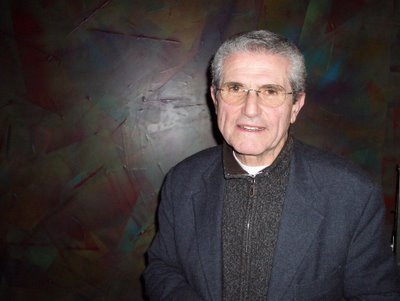Love and Anarchy
 Claude LeLouch, the legendary French director, spoke last night after a showing of his new movie, The Courage to Love, at the staggeringly great Starz Denver International Film Festival. It's staggering because you can't possibly see but a small set of the nearly 200 movies being shown this week. And it's great to hear from filmmakers such as LeLouch, to understand all that goes into making a feature film.
Claude LeLouch, the legendary French director, spoke last night after a showing of his new movie, The Courage to Love, at the staggeringly great Starz Denver International Film Festival. It's staggering because you can't possibly see but a small set of the nearly 200 movies being shown this week. And it's great to hear from filmmakers such as LeLouch, to understand all that goes into making a feature film.LeLouch's most famous movie for American audiences is "A Man and A Woman." His most recent offering seems problematic and has bombed in France, I heard at the French Reception afterward. LaLouch in his live interview with a film critic after the movie said he has made four versions of the movie, all of which will be viewable on the DVD. We saw the one most suited to international audiences. "The French version cannot even be understood by the French," he said through a translator. Myself, I liked it because it snarled up all the love relationships, which seems somehow accurate to love's refusal, on its own, to walk a straight line to happiness. I'm not saying the characters in the movie made good choices in their infidelities, jealousies, and suicides. But such potential darkness lurks just below the surface of any decent life, in my humble opinion. Seeing the distinctive French penchant for anarchy--recently played out yet again "dans les rues," in the streets--always invigorates part of me that chafes at my mainly linear, English way of being in the world. Being one-fourth French, it's clear to me that life ain't in any way a straight line, mon ami.
The film festival opened with a new movie based on the true story of a New Zealander who, in his 70s, realized a long-held dream to set a motorcycle speed record on the Bonneville Salt Flats. Anthony Hopkins, in the role of a lifetime, plays the hero, who lives in a shed and makes his way to Utah in a Don Quixote-like series of misadventures. The movie is "The World's Fastest Indian." Don't miss it.
Another highlight so far was a showing of "Only the Brave," a movie which a friend of mine, Eric Hayashi, co-produced. It tells the story of Japanese-Americans who, after having been sent to detention camps after Pearl Harbor, nonetheless volunteered to fight and die for the U.S. in Europe. After the packed showing yesterday afternoon, Eric asked if there were any veterans in the audience. Three very old Japanese-American men stood up slowly to heart-felt applause. One of the veterans had fought with the unit portrayed in the movie.
I also saw a very weird Japanese movie, L'Amant, about three middle-aged men who purchase the sexual services of a schoolgirl. It wasn't erotic, it was just weird. When Fifi is out of town, I like going to movies I know she would never agree to see. A better one with erotic themes was "How the Garcia Girls Spent their Summer," about a girl, her mother, and her grandmother all going through problematic but life-giving romances one summer in a Texas border town. The director, Georgina Garcia Riedel, spoke afterward. She looked to be about 25 years old, which made her accomplishment remarkable. She declined to say how much it had cost to make her movie, because she is trying to get it sold to a distributor and she needs to preserve her bargaining position. But she did say that the generosity of her parents had made the production possible. "What did they think of the sexual content?" a member of the audience asked. "Oh, they've always known I was a bit odd," Georgina replied with a warm laugh, "but they've always totally supported me in my art. This film isn't as shocking as some of the work I did in graduate school."
